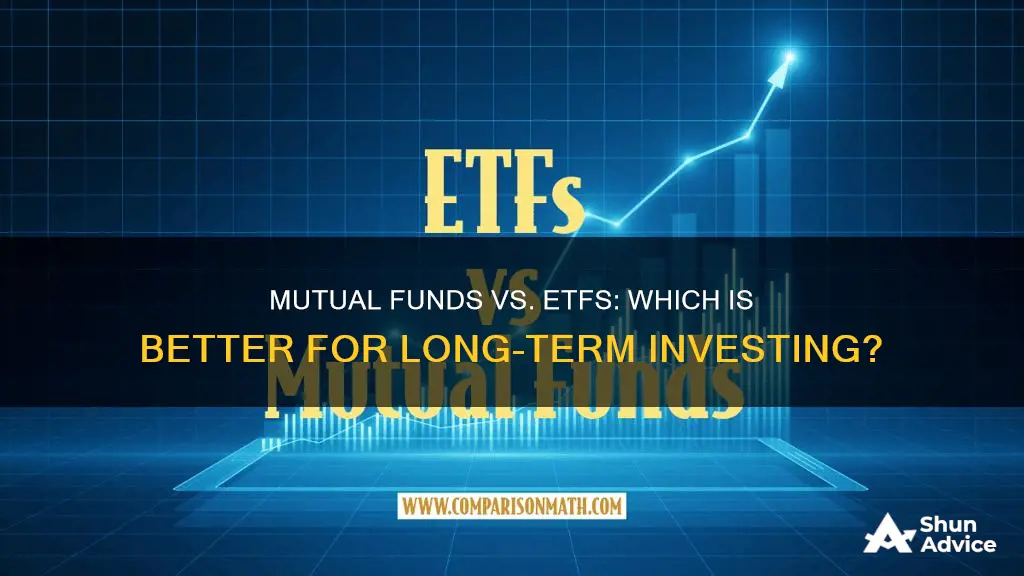
Exchange-traded funds (ETFs) and mutual funds are investment vehicles that pool money from investors to build a portfolio of assets. While both are similar in many ways, there are some key differences to consider when deciding whether to invest in ETFs or mutual funds for the long term.
ETFs are traded on exchanges like stocks, offering intraday liquidity and allowing investors to buy and sell throughout the day. They often have lower expense ratios and are more tax-efficient due to lower turnover and fewer transactions that trigger capital gains taxes. ETFs usually have lower investment minimums, allowing investors to buy a single share. However, ETFs may have wider bid-ask spreads, resulting in higher costs.
On the other hand, mutual funds are typically bought and sold only once a day at the closing price. They offer the convenience of automatic investments and withdrawals and are commonly actively managed, aiming to outperform the market. Mutual funds may have higher fees, including 12b-1 fees, which compensate advisors for selling the fund. They often have minimum initial investment requirements, ranging from $500 to $5,000 or more.
The choice between ETFs and mutual funds depends on an investor's financial goals, risk tolerance, investment style, and tax considerations. Both options can be good tools for long-term investors, offering instant diversification and professional management of fund assets.
| Characteristics | Values |
|---|---|
| Investment options | Both ETFs and mutual funds offer a wide variety of investment options. |
| Risk | Both are less risky than investing in individual stocks and bonds. |
| Diversification | Both come with built-in diversification. |
| Management | Both are overseen by professional portfolio managers. |
| Liquidity | ETFs are more liquid than mutual funds as they can be traded throughout the day. |
| Control over trade price | ETFs provide more hands-on control over the price of your trade. |
| Automatic transactions | Mutual funds allow for automatic transactions. |
| Index funds | Most ETFs are index funds. |
| Investment minimums | Mutual funds have higher investment minimums than ETFs. |
| Tax efficiency | ETFs are more tax-efficient than mutual funds. |
| Transaction frequency | Mutual funds can only be bought or sold once a day. |
What You'll Learn

Mutual funds vs ETFs: pros and cons
Exchange-traded funds (ETFs) and mutual funds are both structures or vehicles that facilitate access to underlying investments. They are similar in that they are both professionally managed collections or "baskets" of individual stocks or bonds. They both offer instant diversification, professional management of fund assets, and less risk than investing in individual securities. However, there are some key differences between the two that make one better suited than the other concerning an investor's investment goals.
Mutual Funds Pros:
- Mutual funds can offer active management and greater regulatory oversight.
- Mutual funds can be purchased in fractional shares or fixed dollar amounts.
- Mutual funds can be bought directly from the company that issues the fund.
- Mutual funds allow for automatic and regular investments.
Mutual Funds Cons:
- Mutual funds can be more expensive to run and own than ETFs.
- Mutual funds can only be bought or sold once a day at the latest closing price.
- Mutual funds may require a minimum initial investment.
- Mutual funds are not as tax-efficient as ETFs due to their higher turnover and greater capital gains.
ETFs Pros:
- ETFs are more cost-effective and liquid since they trade on exchanges like shares of stock.
- ETFs are bought and sold on an exchange throughout the day.
- ETFs don't require a minimum initial investment because they trade as individual shares.
- ETFs are generally more tax-efficient than actively managed funds.
- Many online brokers offer commission-free ETFs.
ETFs Cons:
- ETFs are not suitable for investors who want to beat the index, as they are designed to track an index, not beat it.
- ETFs may not be suitable for investors who want to repeat specific transactions automatically.
- ETFs may have wider bid-ask spreads, which can result in hidden costs.
- ETFs may be less suitable for investors who want to keep things simple, as they offer more sophisticated order types.
Mutual Funds and Investment Trusts: What's the Difference?
You may want to see also

Long-term investment goals
When considering long-term investment goals, it is important to understand the differences between mutual funds and ETFs to make an informed decision. Here are some key points to consider:
Similarities:
Mutual funds and ETFs (exchange-traded funds) share some similarities. Both offer instant diversification and professional management of fund assets, reducing risk and providing convenience. They provide access to a wide variety of U.S. and international investment options, allowing investors to tailor their portfolio to their personal goals and investing style.
Differences:
The main difference lies in their structure and trading mechanisms. ETFs, as the name suggests, are exchange-traded, meaning they can be bought and sold throughout the day on an exchange, similar to stocks. This provides intraday liquidity and flexibility, allowing investors to react to market changes. On the other hand, mutual funds can only be bought or sold once a day at the latest closing price, usually after the market closes.
ETFs often have lower total expense ratios than mutual funds. The passive nature of most ETFs, which aim to track an index, contributes to reduced costs compared to actively managed mutual funds. However, the advantage of lower costs may diminish when comparing ETFs to index mutual funds, which are also passively managed.
Considerations for Long-Term Investment Goals:
When considering long-term investment goals, it's important to evaluate your investment style, risk tolerance, and financial priorities. Here are some points to keep in mind:
- Investment Style and Risk Tolerance: ETFs are generally passively managed, aiming to match the performance of an index. This makes them suitable for investors seeking a long-term, buy-and-hold strategy who prefer passive investment management. Mutual funds can be actively or passively managed, offering the potential to outperform the market but also carrying higher fees and potentially lower tax efficiency due to increased capital gains.
- Tax Efficiency: ETFs are typically more tax-efficient than actively managed mutual funds due to lower turnover and fewer transactions that trigger capital gains taxes. However, the tax advantage may be less significant when comparing ETFs to passively managed index mutual funds.
- Costs: ETFs often have lower expense ratios than actively managed mutual funds. However, when comparing to index mutual funds, the cost difference may not be as significant. It's essential to compare expense ratios when evaluating specific investment options.
- Flexibility and Liquidity: ETFs offer greater flexibility and intraday liquidity, allowing investors to react to market changes. Mutual funds provide a simpler, less hands-on approach with automatic investments and withdrawals.
- Minimum Investment: ETFs usually have lower minimum investment requirements, allowing investors to purchase a single share. Mutual funds often have higher minimum initial investments, which are based on a flat dollar amount rather than the fund's share price.
In conclusion, when considering long-term investment goals, it's important to evaluate your specific needs and priorities. Both mutual funds and ETFs can be suitable for long-term investing, depending on your investment style, risk tolerance, tax considerations, and cost structure. It's essential to carefully review the fund materials, compare fees and performance, and consider how each option aligns with your financial goals and investment strategy.
Index Funds: A Guide to Direct Investing
You may want to see also

Liquidity and flexibility
ETFs are "exchange-traded", meaning they can be bought and sold at any time during the trading day, offering intraday liquidity. In contrast, mutual funds can only be bought or sold once per day after the market closes. This gives ETFs an advantage in terms of flexibility, as investors can act immediately on market changes.
However, it is worth noting that most financial planners advise that typical investors, particularly those investing for long-term goals like retirement, should base their decisions on long-term considerations rather than reacting to rapidly changing market prices.
Another aspect to consider is that ETFs are traded like stocks, allowing for options such as writing options against them, shorting them, and buying them on margin – providing greater flexibility compared to mutual funds.
When it comes to automatic investments and withdrawals, mutual funds offer more flexibility as they allow for setting up automatic transactions, whereas ETFs do not.
In summary, ETFs generally offer greater liquidity and flexibility due to their ability to be traded throughout the day and the option to perform more complex transactions. However, for long-term investors, the advantages of intraday trading may be less significant, and the ability to set up automatic transactions in mutual funds can be a valuable feature.
AI Investment: Top Funds to Watch
You may want to see also

Costs and fees
When it comes to costs and fees, there are several important differences between mutual funds and ETFs. Mutual funds typically have higher fees than ETFs, as they tend to be actively managed and may charge higher expenses, including sales commissions and 12b-1 fees, which compensate advisors for selling the fund. Mutual funds may also have minimum initial investment requirements, ranging from $500 to $5,000 or more, while ETFs usually have no minimum investment requirement and can be purchased for the cost of a single share.
ETFs, on the other hand, tend to be passively managed, tracking a preset index rather than actively picking stocks. This passive management style generally results in lower fees for ETFs compared to actively managed mutual funds. Additionally, ETFs do not charge sales commissions or 12b-1 fees. However, investors may need to pay brokerage commissions when buying or selling ETFs, and some brokers may charge early redemption fees.
It is worth noting that the expense ratio, which represents the cost of the fund as a percentage of total assets under management, is an important factor to consider when comparing fees between mutual funds and ETFs. Mutual funds may include management fees, 12b-1 fees, account fees, redemption fees, exchange fees, and purchase fees, while ETFs may have lower administrative and operational costs due to market-based trading.
In terms of tax efficiency, ETFs may offer some advantages over mutual funds. Investors in ETFs only pay capital gains taxes when they sell shares, whereas mutual funds may distribute taxable gains to investors even if they merely hold the shares. Additionally, ETFs engage in less internal trading, resulting in fewer taxable events.
Mutual Funds: Long-Term Investment Safety and Security
You may want to see also

Tax implications
When it comes to tax implications, there are a few differences between mutual funds and ETFs (exchange-traded funds). While both are taxed on dividends and capital gains distributions, as well as gains from market transactions, ETFs are generally considered to be more tax-efficient. This is because ETFs typically generate fewer capital gains, which are taxable to investors.
Taxable Events
ETFs have fewer "taxable events" than mutual funds. In the case of mutual funds, a fund manager must constantly rebalance the fund by selling securities to accommodate shareholder redemptions or to reallocate assets. These sales create capital gains for the shareholders, even if they have an unrealized loss on their overall investment. ETFs, on the other hand, accommodate investment inflows and outflows by creating or redeeming "creation units", which are baskets of assets that approximate the ETF's investment exposure. This means that investors are usually not exposed to capital gains on individual securities within the ETF structure.
Capital Gains Distributions
Capital gains distributions from mutual funds occur when the fund manager sells some of the fund's assets for a capital gain and passes the earnings along to shareholders. These distributions are taxed at the long-term capital gains rate. ETFs, on the other hand, typically have minimal capital gains distributions due to their passive management structure and index-based nature.
Dividend Taxation
Dividends from both mutual funds and ETFs are taxed according to how long the investor has owned the fund. If the investor has held the fund for more than 60 days before the dividend was issued, it is considered a "qualified dividend" and is taxed at a lower rate than if the investor had held the fund for less than 60 days.
Tax Exemptions and Retirement Accounts
It is important to note that there are some tax exemptions for both ETFs and mutual funds, such as Treasury and municipal securities. Additionally, investments held in retirement accounts, such as 401(k)s or IRAs, are typically tax-advantaged, and the tax efficiency of ETFs vs. mutual funds becomes less meaningful in these cases.
Overall Tax Efficiency
Due to the differences outlined above, mutual funds typically generate higher capital gains and, therefore, may result in a higher tax bill for investors. However, it is worth noting that not all mutual funds are created equal, and some may be more tax-efficient than others. For example, index funds tend to have lower turnover and, therefore, fewer taxable events than actively managed funds.
In summary, while ETFs are generally considered more tax-efficient than mutual funds due to their structure and passive management, there are other factors to consider when deciding between the two, such as the quality of the investment, historical and projected performance, and investment and administrative charges.
Finding Investment Funds: A Comprehensive Guide to Sources
You may want to see also
Frequently asked questions
Mutual funds are actively managed and offer greater regulatory oversight. They are also more suitable for investors who want to repeat specific transactions automatically.
ETFs are more cost-effective and liquid since they trade on exchanges like shares of stock. They are also more tax-efficient and offer intraday liquidity.
Mutual funds are bought and sold only once a day at the latest closing price, whereas ETFs are bought and sold on an exchange throughout the day. Mutual funds also require a minimum initial investment, which is not the case with ETFs.







